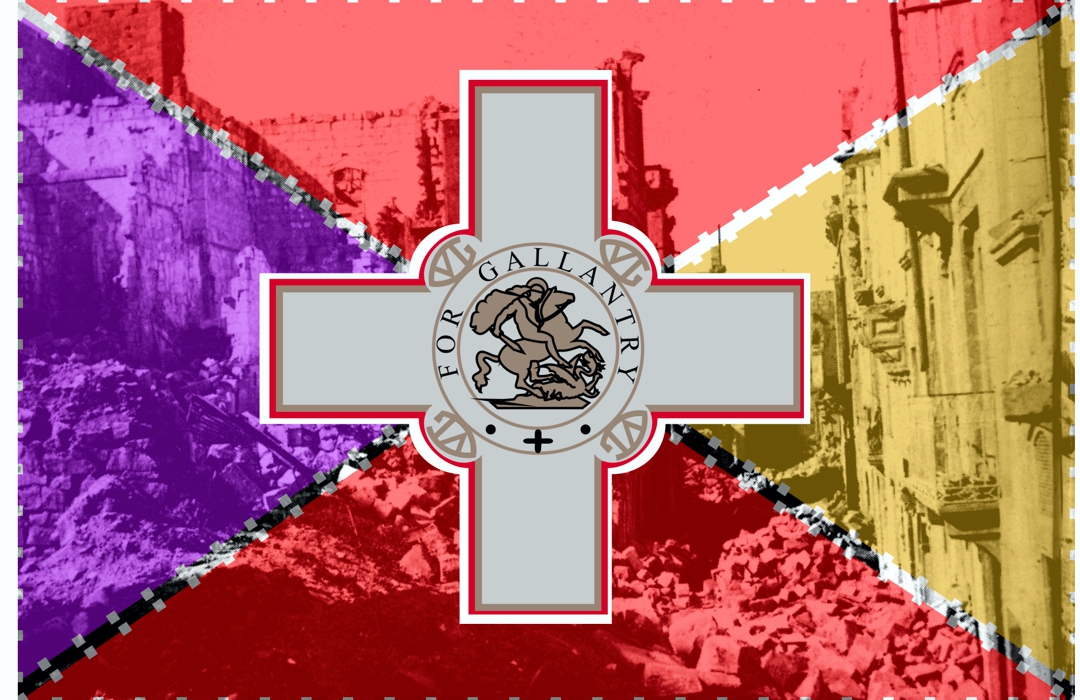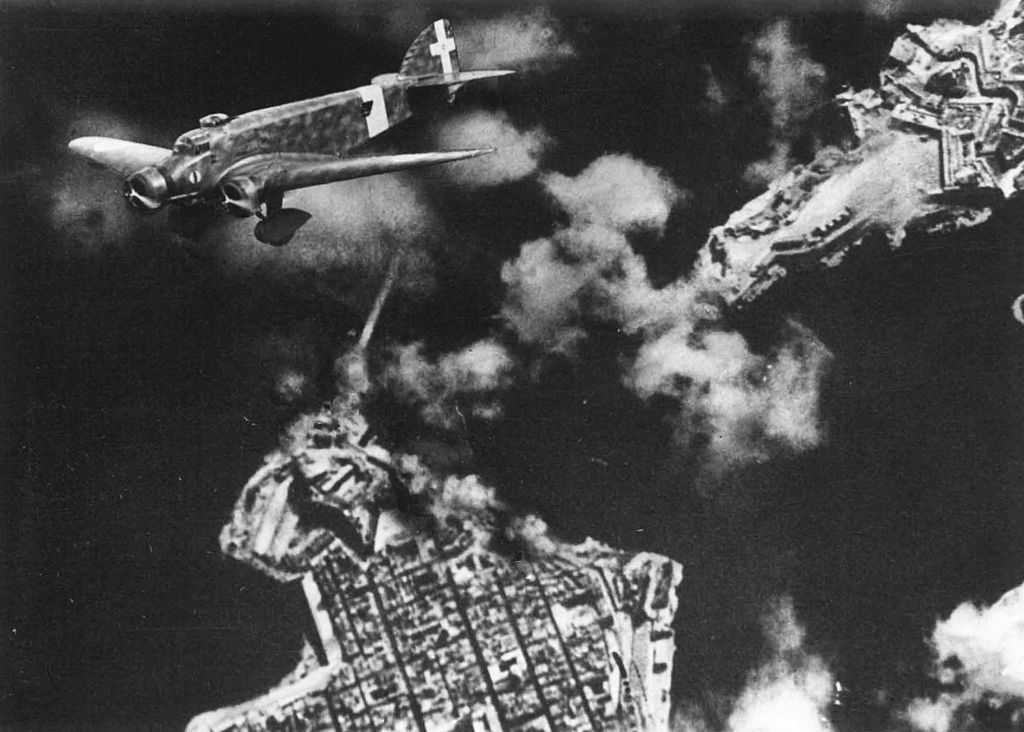
The George Cross can be a powerful anti-fascist symbol that is backed by historical evidence and resonates deeply with the population of the Maltese islands. It can be a symbol of a Malta that stood as a beacon against the dark tide of Nazi-Fascism.
by Francois Zammit
Collage by the IotL Magazine
[dropcap]T[/dropcap]he debate on whether the George Cross should be part of Malta’s national flag has been revived yet again. Mostly dominated by academics and historians, this heated debate revolves around different interpretations of the George Cross’ symbolism and, more importantly, what it signifies to the nation. However, it may be high time to debate another meaning of the George Cross—the one that concentrates on political ideology.
Unlike the eight-pointed cross which is (incorrectly) referred to as the Maltese Cross, the George Cross is inscribed in the constitution of an independent and self-governing Malta, which implies that it is considered as a national symbol, is separate from Malta’s role as a former British colony and that its removal or replacement requires a constitutional change, albeit necessitating a two-thirds majority vote in parliament.
The Power of Symbolism
Symbols are a powerful means of communication that are laden with meanings and values. Symbols are not neutral and what they represent is never objective or universal. They do not exist in a vacuum; thus their meaning should be understood in a specific context.
The meaning of symbols changes according to historical and social contexts; they are continuously appropriated and manipulated for political gain. Swastika—one of the most recognisable and infamous symbols—originated and is still prevalent in the regions practicing Buddhism and Hinduism, however it was appropriated by German nationalists and later on by Adolf Hitler, thus distorting its original meaning for a sinister purpose.
Following the atrocities perpetrated by the Nazi regime and its allies, the Swastika has become a symbol of horror and crimes against humanity—and a symbol of a very specific type of political ideology.
Symbols are not neutral and what they represent is never objective or universal. They do not exist in a vacuum; thus their meaning should be understood in a specific context.
Any discussion or debate over symbols is therefore not limited to the symbol per se, but also reflects the power struggles and social and political realities that exist around that symbol. The meaning of national symbols is therefore inseparable from the very fabric of political realities and understanding of the identity of a nation and its people.
The George Cross Controversy
The George Cross, was awarded by King George VI in 1942:“To honour her brave people I award the George Cross to the Island Fortress of Malta to bear witness to a heroism and devotion that will long be famous in history.” This award was given as a symbolic gesture to recognise the role and hardships of the Maltese people during the onslaught of Nazi-Fascism in their bid to control the Mediterranean.
1942 is a key date in the history of World War Two because it marks the turning point of the war. Prior to 1942, the Axis armies seemed invincible under the guidance of the Third Reich’s generals and the superiority of its military technology. It was only in 1942, with the defeats at Stalingrad and Al Alamein, that the theatre of war started changing (also with the help of the mighty military industrial complex of the United States who joined the Allies as a result of the attack on Pearl Harbour).
1942 is a key date in the narrative of the George Cross and of Malta’s role in the war.

Many argue that the Maltese islands became a target of Mussolini’s plans because they were a British colony, therefore placing them as unwilling participants in a war that had nothing to do with them. In 1940, when Mussolini declared war on the Allies, the Italophile factions in Malta believed that Fascist Italy would never attack the Maltese islands as an act of courtesy for the long-standing ties and relations between the two peoples. However, the islands were not spared from the horrors of war, and at one point a landing and invasion of the Maltese islands was also on the tables of the Axis generals. The events that happened during this period are well-recorded and still have a strong role in the collective memory of the Maltese people.
It is crucial to memorialise some of the social-political effects of the war on the Maltese people, which may have left deeper scars than the bombed-out Opera House.
World War Two has to be remembered not only as a war among nations, but as an ideological war—a total war—which placed all aspects of life in terms of ideology and was willing to sacrifice every moral and legal norm in its name. This meant that both the Allies and the Axis powers were willing to breach any rules of war to achieve ultimate victory; more crucially was the erasure of the distinction between combatants and non-combatants as legitimate targets.
World War Two has to be remembered not only as a war among nations, but as an ideological war—a total war—which placed all aspects of life in terms of ideology and was willing to sacrifice every moral and legal norm in its name.
Just like in other theatres of war, in the Maltese context, military powers did not attempt to avoid civilian casualties, and all targets were considered as potential objectives to be destroyed from the air. Similarly, legal norms were not considered limitations to the actions of the political and administrative institutions.
This sense of justification permitted the Italian Fascist regiment to imprison and transfer Maltese migrants who lived in the occupied territories of Tripolitania (Libya) and the Maltese colonial administration who deported and interned a number of Maltese, who were deemed as Italian sympathisers, to Uganda. In both instances, due process and the rule of law were ignored, and the state powers acted with impunity. Such instances show that there are festering wounds which still bear influence on the collective memory of the Maltese people, also explaining why the George Cross remains a controversial symbol.
The George Cross in 2019
In 2019, with the upcoming MEP elections, the symbolism of the George Cross needs to be re-evaluated again. Even though Malta was attacked by the Axis forces due to it being a British colony, it would have been attacked and possibly invaded anyway, even if at the time it was a neutral and non-belligerent nation.
Mussolini dreamt of reinstituting the Roman empire and of taking the role of the new Caesar. The Fascist state saw the Mediterranean Sea as Mare Nostrum, and all the lands around it were to be part of this new Italian empire. This project prompted the Italian forces to join their Nazi allies in invading the Balkan states, Greece and North Africa. In this context, the George Cross should be interpreted as a symbol of resistance to and freedom from Nazi-Fascism.
Amid a surge of the far-right ideology across Europe, the George Cross needs to be re-asserted for what it originally stood—a symbol of the heroism of a people in the war against the tide of Fascism.
Amid a surge of the far-right ideology across Europe, the George Cross needs to be re-asserted for what it originally stood—a symbol of the heroism of a people in the war against the tide of Fascism.
Malta itself is not immune to this phenomenon. The list of candidates registered on the Maltese ballot includes two political groups—Imperium Europa and Moviment Patrijotti Maltin—that identify with nationalistic and far-right ideologies. Norman Lowell has no quandary of quoting the Nazi regime, including eugenic theories and obscure volk myths. Moviment Patrijotti Maltin also claim their goal is to preserve authentic Maltese identity and culture from a supposedly civilizational clash—just as Fascist ideologues did in the past and still do today. These groups and their supporters are appropriating symbols from European history—including the Maltese Cross—in order to buttress their narrative of the European civilizational superiority and the inferiority of non-European ‘others’.
We must not allow Maltese history and its symbols to be monopolised by the far-right, and the only way to do so is to tell the full story and to reinstate the power of symbols that represent the anti-fascist struggle. The far-right has already attempted to hijack the 8th of September, Victory Day, for their own celebration. According to their narrative, this national holiday commemorates the fight of the Christian Europe against the tide of Islam, thus making Malta a beacon of Christianity. However, this storyline ignores that Victory Day also commemorates victory over the Axis besieging forces.
The George Cross and Victory Day can be powerful anti-fascist symbols that are backed by historical evidence and resonate deeply with the population of the Maltese islands. It can be a symbol of a Malta that stood as a beacon against the dark tide of Nazi-Fascism.
Leave a Reply